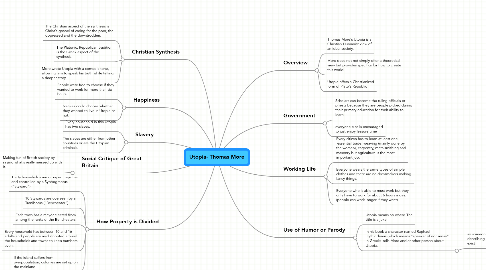Utopia- Thomas More
por kinsey Cohen


1. Christian Synthesis
1.1. The Christian aspect of the synthesis is Christ's gospel of caring for the poor, the oppressed and the downtrodden.
1.2. The Platonic, Republican tradition is the Greek aspect of the synthesis.
1.3. More wrote Utopia with a comedic tone, allowing him to speak his truth while telling a deeper story.
2. How Property is Divided
2.1. Thirty households are grouped together and controlled by a Syphograntus ("Styward").
2.2. 10 Stywards are overseen by a Traniborus ("Bencheater")
2.3. Each town has a mayor elected from among the ranks of the Bencheaters.
2.4. Every household has between 10 and 16 adults and people are re-distributed around the households and towns to keep numbers even.
2.5. If the island suffers from overpopulation, colonies are set up on the mainland.
3. Slavery
3.1. Every household in this Utopia has two slaves.
3.2. The slaves are either from other countries or are the Utopian criminals.
4. Social Critique of Great Britain
4.1. Making fun of British society by saying what's really messed up with it.
5. Happiness
5.1. People were free to choose if they wanted to work for more than six hours.
5.2. Natives could choose whether they wanted to live in Utopia or not.
6. Overview
6.1. Thomas More's Utopia is a Christian-Humanist view of an ideal society.
6.2. More does not not simply offer a theoretical view but provides specifics for how to create this world.
6.3. Utopia offers a Christianized form of Plato's Republic
7. Use of Humor or Parody
7.1. Utopia means no where-The title is a joke.
7.2. In his book a character named Raphael Hythlodeaus (which means "speaker of nonsense" in Greek), tells More and another person about Utopia.
7.2.1. so someone who speaks nonsense is describing the world that doesn't exist
